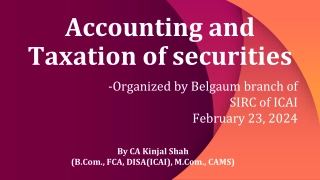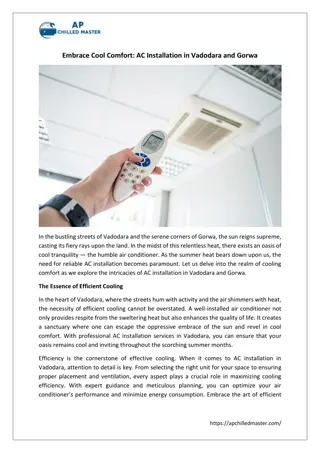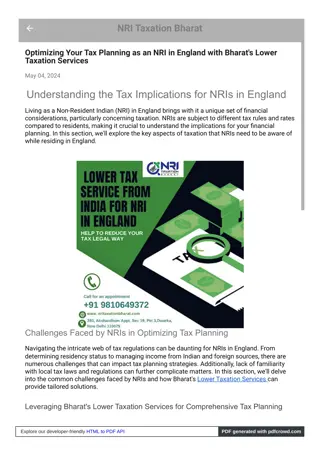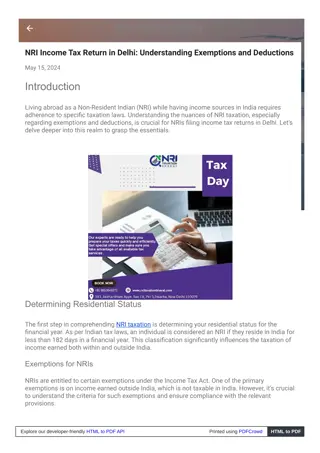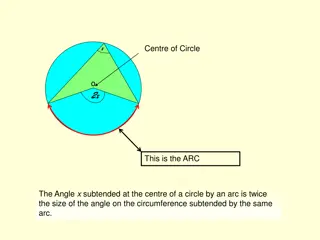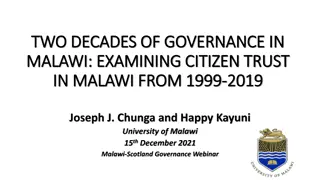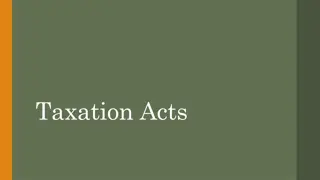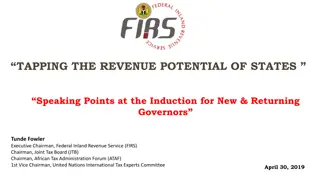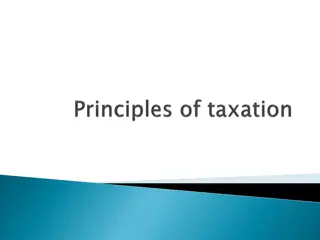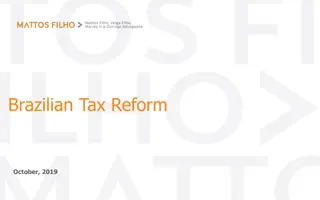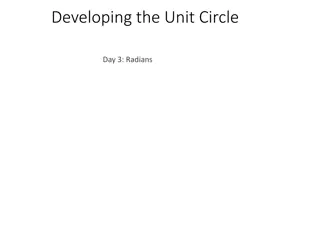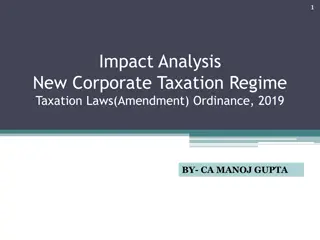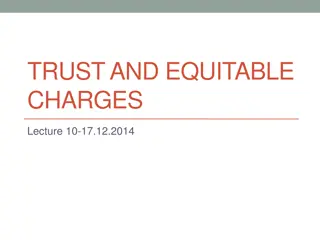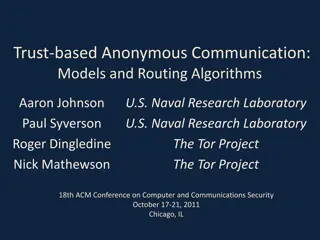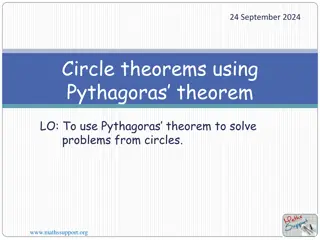
Income Tax Provisions for Charitable Trusts and Corporate Governance Committee
Learn about important issues related to audit, taxation, and corporate governance committee of charitable trusts under the Income Tax Act of 1961. Understand the sections applicable, definitions, exemptions, and recent amendments affecting the tax-exempt status of trusts.
Download Presentation

Please find below an Image/Link to download the presentation.
The content on the website is provided AS IS for your information and personal use only. It may not be sold, licensed, or shared on other websites without obtaining consent from the author. If you encounter any issues during the download, it is possible that the publisher has removed the file from their server.
You are allowed to download the files provided on this website for personal or commercial use, subject to the condition that they are used lawfully. All files are the property of their respective owners.
The content on the website is provided AS IS for your information and personal use only. It may not be sold, licensed, or shared on other websites without obtaining consent from the author.
E N D
Presentation Transcript
IMPORTANT ISSUES AUDIT & TAXATION OF CHARITABLE TRUST CORPORATE & ALLIED LAWS & CORPORATE GOVERANANCE COMMITTEE OF WIRC OF ICAI HOSTED BY BHARUCH BRANCH OF WIRC OF ICAI HELD ON 28.12.2019 CA SAMIR PARIKH AMIN PARIKH & CO CHARTERED ACCOUNTANTS BARODA. Reached at: parikhsamir27@hotmail.com
INCOME TAX PROVISIONS APPLICABLE TO TRUST MAIN SECTIONS APPLICABLE INCOME TAX ACT, 1961 Definition of Charitable Purpose Section 2(15) Section 2(24)(iia) The term Income includes Voluntary contribution Exemption of Certain Trust Section 10 Section 11, 12 & 13 Exemption Registration and Audit, Exclusions from Exemption, Investment, Business Income etc. Section 80G- Recognition of exemption Section 139 (4A) Filling of Return of Income TO TRUST UNDER of income,
Charitable Purpose Section 2(15) defines Charitable Purpose to include Relief to Poor, education, Medical and the advancement of any other object of general public utility. The objects of preservation of environment including water sheds, forest and wild life) and preservation of monuments or places or objects of artistic or historic interest added as charitable objects w.e.f. 1-4-2009
Amendmend in the definition of Charitable Purpose By Finance Act, 2008, a proviso has been added to provide that if advancement of any other object of general public utility involves carrying on any activity in the nature of trade, commerce or business or any activity of rendering any service in relation to any business, for a consideration in the nature of cess or fee or any consideration, it shall cease to be a charitable purpose.
Effect of the Amendment The direct effect of the amendment is that in case of trust for advancement of any other object of general public utility, if it involves the carrying of any activity in the nature of trade, commerce or business or activity of rendering service in relation to said business for a cess, fee or any other consideration, the exemption will not be allowed in respect of such income irrespective of the nature of use or application or retention of the income from such activity. Further it is not only the business income but the entire income of the trust will be taxable.
Effect of the Amendment Intention of the legislator appears to be reverse of the ratio of the judgment of the supreme court in the case of CIT Vs Gujarat Meritime Board 295 ITR 561[SC] Chambers of Commerce and Trade Organisations, Gymkhana and Clubs which are claiming exemption u/s 11, may lose exemption consequent to this amendment.
Effect of the Amendment ICAI Accounting Research Foundation Vs DGIT 321 ITR 73 [Delhi] Section 25 company registered u/s 12A of IT Act denied exemption u/s 10[23C][iv] on the ground that providing professional services on a regular basis is a commercial activity not a Charitable activity On writ petition, Delhi High court held that Foundation is entitled to exemption under section 10[23C][iv] being falls under the object of general public utility and charging of amounts from govt. bodies would not make the activity Commercial . Amended definition of Charitable Purpose would not alter this position.
Effect of the Amendment The CBDT has issued a circular No. 11/2008 dated 19-12-2008 stating the implications arising form the amendment. Proviso not apply to first three limbs of section 2(15) even if incidentally involves the carrying on of commercial activity. Proviso apply only to fourth limb i.e. object of general public utility.
Effect of the Amendment If a trust is formed for educational or medical purpose and also for general public utility, will the income from activities for education or medical objects be exempt and only that for the general public utility be taxable to the extent it arises from business activities? The trust can not be partly charitable and partly non charitable Yogiraj Charitable trust Vs. CIT 103 ITR 777[SC]. Exception to this view as per section 11(1)(b) for trust created before 1-4-1962
Effect of the Amendment Trust for Religious Purpose Whether public religious trust is affected by the amendment? Religious trust cant not be considered to be a trust for general public utility will not hit by amendment. Since section 11 to 13 and 10[23C] use both the expressions charitable and religious purpose, it is clear that for the purpose of exemption religious is distinct from chartable purpose.
Amendment by Finance Act, 2010 Inserting second proviso effect from A.Y. 2009-2010 small and amendment would not apply to trust having annual aggregate gross receipts from such commercial activities does not exceeds Rs. 10 Lacs. Gross Receipts of the trust not to be considered but gross receipts from commercial activities to be considered for Limit of Rs. 10 lacs. with retrospective providing relief to trust. Provides medium that
Practical application of the proviso. Trusts having income from commercial activities may be regarded as charitable in one year if receipts from such activities is less that Rs. 10 Lacs, may lose the exemption in subsequent year if the receipts from such activities exceeds Rs. 10 Lacs and may once again get the benefit in the 3rdyear if the receipts are again below Rs. 10 lacs. difficulties would be faced in
What is a position of registration under section 12AA? Whether registration would be cancelled if trust lose exemption by virtue of amendment in definition of charitable objects and not meeting the criteria? What would be status of those trusts who applied for registration u/s 12AA in F.Y. 2008-09 and denied registration on the ground of amended provision in definition of charitable purpose?
Relief of the Poor Relief of poor means granting of relief to indigent persons by making contributions or payments towards their aid and support, whether in cash or in kind. Providing meals, clothing and shelter to the needy poor, free of cost or at concessional rates would amount to relief of poor. But, in order to be recognised as charitable, the activities must be for the benefit of public at large or for a large cross-section of the public. Any such relief to a body of private individuals would not be for public at large. Mercantile Bank of India Agency, 10 ITR 512 (Cal.).
Trust for relief of poor relatives of the settler of the trusts would not be a charitable purpose, because charitable purpose contemplates benefit to the public at large or a large cross-section of society identifiable by some common quality. Trustees of Gordhandas Govindram Family Trust v. CIT 21 ITR 231 (Bom.). However, if the dominant object of the trust is to grant relief to the poor in general, any direction or power given in the trust deed to the trustees for giving preference to poor relatives of the settler would not come in the way of the trust being recognized as a chartable one. Trustees of Charity Fund v. CIT 36 ITR 513 (SC).
Education Education which is used in the Income-tax Act in a limited sense, connotes the process of training and developing knowledge, skill, mind and character of students by normal schooling. Trustees of Lok Shikshan Trust v. C.I.T., 101 I.T.R. 234 (SC). FOLLOWING ACTIVITIES ARE HELD AS EDUCATIONAL Diffusion of useful knowledge, publication of journals and promotion of search for truth. Ecumenical Christen Centre v. CIT 139 ITR 226 (Ker.). Trusts running schools It is not necessary that the educational activity should be undertaken only by an institution. A trust with the object of running schools can be recognised as a one for educational purpose. See CIT vs. Sindhu Vidya Mandal Trust, 142 ITR 633 (Guj.).
However, in following cases, the activity was not accepted as educational : Coaching students for particular examination dose not amount to education. Se Bihar Institution of Mining and Mine Surveying v. CIT 208 ITR 608 (Patna). Mere granting of scholarships to students is not education or educational activity. See C.I.T. v. Sorabji Nusserwanji Parekh, 107 CTR (Guj) 72 Karnataka High Court has however, taken a different view that granting of scholarships will fall in the connotation of education CIT v. Saraswath Poor Student Relief Fund, 150 ITR 142 (Kar.). Printing and publishing of News Paper is not education, in its imited sense. See CIT. vs. Sole Trustee, Lok Shikshana Trust, 101 ITR. 234 (SC).
Medical Relief Doing business for the purposes of achieving the object of medical relief would not disentitle a trust / institute from being held as a charitable one, so long as the activity is ancillary to the main object of medical relief and the profits of the business are used for the purposes of achieving the main object. See P. Krishna Warriar v. CIT 84 ITR 119 (Ker.) (In this case, the trust was preparing and selling medicines to achieve its object of medical relief). However, mere manufacture or sale of medicines with no charitable object but only with profit motive would amount to carrying on business for profit and would not be an activity of charity. (See East India Industries (Madras) P. Ltd. vs. CIT 65 ITR 611 (SC).
Advancement of any other object of general public utility This is a residuary category. Those charitable objects, which may not be classified as relief of poor, education and medical relief, would come under this class, if these are aimed at public good. Following are some of the instances where activities are accepted as of public utility: Chamber of Commerce & Industry (Cochin Chamber of Commerce & Industry v. CIT 205 ITR 536 (Ker.)) Establish, equip and maintain industrial homes for teaching unemployed persons in arts like handicrafts and other home industries. CIT v. J.K. Charitable Trust 59 Taxman 602 (Allahabad).
Advancement of music and other fine arts holding musical entertainments, bhajans, exhibitions and lectures. CIT vs. Shri Thyaga Brahma Gana Sabha, 52 Taxman 395 (Mad.). In India, charitable activities include religious activities and hence institutions which are recognized as for charitable purposes can claim exemption in respect of donations given for constructions of church, as construction is a purpose of general public utility. CIT v. Social Service Centre 250 ITR 39 A.P. dramas, dance recitals,
Maintenance of swimming bath for public in general. C.I.T. v. Beach Candy Swimming Bath Trust, 27 ITR 279 (Bom.). Dissemination of knowledge to the people and the raising of moral, intellectual, economic, social and political conditions in general. Ganga Prasad Varma Memorial Society v. C.I.T. 134 ITR 421 (All). Association for purpose of maintenance of Samadhis of Guru and memorials of religious & spiritual saints for benefit of the public at large. CIT vs. Guryani Brij Balabh Kaur Trust, 125 ITR 381 (P. & H.). Establishment of Bar Councils. CIT v. Bar Council of Maharashtra, 130 ITR 29 (SC). Samaj Kalyan Parishad Vs ITO.(2007) 105 ITD 29(Delhi)(SB)
Religious Purpose Unlike the words Charitable Purpose , the term Religious Purpose is not defined under income tax act, but it would include the advancement, support or propagation of religion. Religious trust are entitled for Exemption under section 11 if they are public trust and not a private trust.
Exemption of certain Trust Section 10 grants exemption to certain types of Trusts and institutions. Those eligible trust/institutions are not liable to get registered with commissioner or to get accounts audited under section 12A[b]. They are also not required to spend their income as per limits prescribed by section 11 or observe the restrictions regarding prescribed under section 11[5]. Investments as
Exemption of certain Trust It is advisable for a trust to who qualifies for exemption under section 10 to registered under section 12A so as to qualify for exemption under section 11 also. In order to qualify for total exemption, the trust should apply its income towards the objects of the trust and should not operate for making a profits, however any profit/surplus is arise incidentally in carrying out activities, it does not lose the exemption.
Exemption of certain Trust Institutions are exempted under section 10 - Scientific Research Association 10[21] - Educational Institutions 10[23C][iiiab], [iiiad] & [vi] 10[23C][iiiac], [iiiae] & [via] - Medical Institutions - - Professional Associations 10[23A] - Khadi & Village Industry Development Institutions - 10[23B]
Income of Charitable Trust All Voluntary contributions received by a religious or charitable trust or medical or educational institution would constitute its income under section 2[24][iia] irrespective of the fact that the trust is exempt under section 10 or 11 except trust covered under section 10[23C][iiiab] &[iiiac] voluntary contribution is not a income of such trust. in whose hands
Section contributions [other than corpus] shall be income derived from property held under the trust. Anonymous donations are taxed at the rate of 30% in the hands of all trust/institutions except trusts or institutions established for religious purpose. 12 provides that all voluntary
Donation to Corpus is taxable or not? corpus is not defined in the act but general view is that any donation made for a specific direction that only interest received on investment of such donation be utilized for objects of the trust would be a donation towards the corpus of the trust. Presumably all donation are income as per section 2[24] though it does not specifically provides that corpus donations would be income of the trust neither it provides for an exclusion of corpus.
Section donations made with a specific direction that they shall form part of the corpus. Necessary precautions to be taken to claim donation received as corpus donation for exemption. 41 TTJ [Del] 408 Lala Kanshi Ram Goela Charitable trust Vs ITO Probodhan Prakashan Vs. ADIT [E] 50 ITD 135 11[1][d] grants exemption to
Income of the trust constitutes income from property, business, dividend, interest etc and voluntary contributions/donation as per section 12. Total income as defined in section 2[45] is not applicable to trust entitled to exemption u/s 11 in the sense all the oulflow [application] for the trust are allowable as application otherwise not allowable as deduction in case of other assessee.
Grants for specific projects received by trust from other organizations including foreign agencies with a stipulation to be utilized for specific projects would constitute an income of the recipient trust? Nirmal Agriculture Society V/s ITO 152[Hyd] Tribunal held that grants were not donation within the preview of section 12 CIT Vs. Gem & Jewellery Export Promotion Council 143 ITR 579- Bombay High court took a different view. 71 ITD
Atleast 85% of the income derived requires to be utilized/applied for the objects of the trust Administrative Expenses like salaries, misc exps etc for carrying out charitable or religious activities is deductible under the provisions of section 11[1][a] as an application of income for charitable or religious purpose. Parsi Zoroastrian anjuman trust Vs CIT 163 ITR 832 Madhya Pradesh High court
Exempt income under section 10 or on other grounds to be deducted while computation the income of a charitable trust for the purpose of section 11. Trust having exempt as well as non exempt income, better to keep separate account to track the expenses incurred on earning those incomes. CIT Vs.Panchayati Akhara Nirmal 190 ITR 121- Allahabad High court
Provisions of section 14A are not applicable to amounts applied by a charitable trust on its objects. 14A applies when the income is computed under chapter VI of the IT Act, while the income of the trust is computed under chapter III without reference to heads of income.
Income tax & Wealth tax paid by a trust be allowable as deduction while computing income under section 11[1][a]. CIT Vs. Baroda Industrial Corporation Limited 24 Taxman 36 [Gujarat High court] CIT Vs. Ganga Charity Trust Fund 162 ITR 612 [Gujarat High court ] Development
Depreciation on assets of a trust is to be deducted for the purpose of calculating income of the trust even if capital value of the assets on which depreciation is claimed had been allowed section 11 as an application of income. 146 ITR 28 CIT Vs Society of the sisters [Karnataka High court 198 ITR 598 CIT Vs Sheth Manilal Ranchhoddals Vishram Bhavan Trust [Gujarat High Court] Escorts Ltd Vs. Union of India 199 ITR 43 Supreme Court took contrary view of double deduction as a deduction under
Exemption under section 11 Section 11[1][a], income from property held under the trust for religious or charitable purpose is exempt to the extent it is applied for such purposes in India. Not necessary to be applied out of income of the previous year. It may be applied out of earlier years income also. Expenditure considered as application of money.
Administrative Expenses Capital Expenses M.Ct.M.Tiruppani Trust Vs. CIT 230 ITR [SC] Loans and Loan scholarship Reserves for specific purposes Deficit of earlier years CIT Vs Mahahrana Mevar Charitable Foundation 164 ITR 439 [Raj] and CIT Vs, /Shri Plot Swetamber Murti Pujak Jain 211 ITR 293 [Guj] Donation to another Trust
Accumulation under section 11(1)(a) In addition to the income applied on charitable religious purpose, income accumulated or set apart for application to such purposes income is exempt. The accumulation up to 15% is without any conditions . Surplus in excess of 15% which will be liable to tax and not the entire surplus since the accumulation under section 11[2] is in addition to the accumulation under section 11(1)(a). CIT Vs. A.L.N.Rao Charitable Trust 216 ITR 697[SC] or up to 15% of the
Explanation to section 11(1) It is likely that under the principles or method of accounting followed by a trust, some of the income is accounted for as income on accrual basis such as interest on deposit etc. When such income is not actually received during the year in which it is accounted for, it will naturally be not available for application on the objects of the trust. Keeping this explanation stipulates that such income will be taken as applied for the purposes of working out the 85% application of the accounted for income of a trust. position in view the
The amount when actually received and applied will not be considered as applied on the object of the trust in the year of receipt to the extent of such income. It is also possible that for any other reason, a trust is not able to spend 85% of its income during a specific year in which the income is accounted for. In such a case, a trust is entitled to state that the shortfall in the application of its 85% of its accounted income would be applied for the objects of the trust in the immediately following accounting period and then it shall not be taken that it had not spent 85% of its income
In such a case the actual application of income on the objects of the trust in the immediately following accounting year, to the extent of the earlier year s shortfall, will not be considered for the application of the 85% of its income in the said immediately following period.
Accumulation of Income Section 11(2) Trust, for any reason can not utilize its income wholly or partially or wants to accumulate its income for some projects not exceeding for 5 years, can accumulate income and exemption under section 11[2] after fulfilling certain conditions laid down. After expiry of 5 years, money so accumulated have to be utilized for the purpose for which it was accumulated. got
IMPORTANT CIRCULARS ISSUED BY THE CBDT REGARDING APPLICATON OF SECTION 11 Repayment of loan earlier taken for fulfilling the objects of the trust would amount to application of income in the year in which the repayment is made. (see Circular No.100 F,No.195/1/72 (IT(A- 1) dated 24.1.73) Where a trust applies amounts to charitable or religious objects out of its corpus and not out of its income, such application will not be considered for working out the 85% application of income of the trust u/s.11 (Minutes of 12th meeting of Advisory Committee dt.17.08.68.)
Regarding condo nation of delay in filing application u/s. 11(2) in Form No.10 for accumulation of income Ordinarily a notice in form No.10 is to be given to the Assessing Officer within the time allowed u/s 139(1) applicable to a trust. If there is delay in filing such application, the Assessing Officer does not have the power to condone the delay. However, under the powers vested in them u/s 119(2)(b) of the I.T. Act, 1961, the Central Board of Direct Taxes have empowered the concerned Commissioner of Income to condone the delay in filing the notice u/s 11(2) in Form No.10 on satisfaction of certain conditions. (Board s Circular No.273 dated 03.06.1980).
If there is short-fall in application of income to the extent of 85% of the income of the trust, it is not enough to give notice of accumulation in Form No.10 only to the extent of the short-fall, but the entire non-applied income of the trust will have to be covered under the notice to be given in Form No.10 (Circular No.12-P(LXX-7 of 1968) dated 26.11.1968. Investment in Indira Vikas Patra and Kisan Vikas Patra are in accordance with the norms and modes specified in Section 11 (5) of the Income Tax Act, 1961 (Circular No.566 dt.17.07.1990). It may be noted that interest on N.S.Cs., Indira Vikas Patra is to be accounted for on accrual basis, every year, irrespective of the fact that the interest is received on encashment of these certificates.
Registration and Audit To avail exemption under section 11, trust is required to register itself under income tax act and required to get the books of accounts to be audited. Registration granted to a trust/institution is binding on the Income Tax Authorities and the nature of trust accepted at the time of registration cannot be questioned at the time of assessment, though registration proceedings are different. Madhya Pradesh Madhyam v/s. CIT 256 ITR 277(MP) Registration under section 12AA does not mean that the trust is automatically entitled for exemption under section 11. It has to apply its income for charitable or religious purpose. and assessment
AO can not deny exemption under section 11 to a trust registered under section 12AA, on the ground that its objects are not charitable or religious in nature. Stock Exchange, Ahmedabad Vs. ACIT 74 ITD 1[ Ahd] With effect from 1stJune, 2010, the right to cancel registration has been extended to cases of registration obtained u/s 12A as well, and not just cases of registration u/s 12AA. Change or Amendments in objects of the trust after granting registration in not statutorily required to be disclosed before the commissioner but it is desirable to do so in terms of form no 10A.
Audit of Accounts under section 12A(b) Total income without giving effect to the provisions of section 11 and section 12, exceeds the maximum amount not chargeable to tax [Rs. 1,60,000], the accounts of the trust for the year must be audited and must file audit Report in form no 10B. It is advisable to take management representation in respect of persons refereed in section 13(3) as the accountant has to verify the correctness of the particulars in annexure to audit report in form 10B. Those who are claiming exemption under section 10(23C)(Vi) & (Via) required to obtained Audit Report in form 10BB
SECTION 11 NOT TO APPLY IN CERTAIN CASES Income from property held under trust for private religious purposes i.e. where the benefit of the trust does not go to the public. In case of a charitable trust or charitable institution, which is created after 01.04.1961 and where the establishment and creation of trust or institution is for the benefit of a particular religious community or caste.


